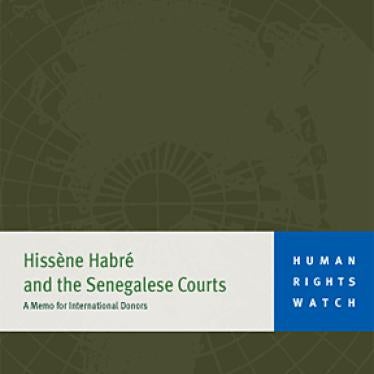(Dakar, Senegal) - On the eve of a key court hearing in the prosecution of the former dictator of Chad, Hissein Habre, human rights organizations stressed Senegal's legal obligation to bring Habre to justice.
On Thursday, May 11, Dakar's three-judge Indicting Chamber will hear a request from Habre's lawyers to dismiss the prosecution on the ground that Senegal has no jurisdiction over crimes committed in Chad. The groups noted, however, that the 1984 United Nations Convention against Torture, which Senegal ratified in 1987, obliges states to either prosecute or extradite alleged torturers who enter its territory. This Convention was the basis for Britain's detention of Gen. Augusto Pinochet for crimes committed in Chile. Under the Senegalese constitution, this treaty directly becomes part of Senegalese law.
"The Torture Convention was adopted in order to deny a ‘safe haven' to those who commit this heinous crime," said Reed Brody, Advocacy Director of Human Rights Watch, one of the organizations which initiated the criminal action. "Habre's theory would turn Senegal's ratification of this key treaty into an empty gesture with no real effect."
Habre's lawyers also seek dismissal because prosecution is barred by the statute of limitations and because Senegal did not adopt national legislation incorporating the Convention against Torture until 1996. Brody noted, however, that neither of these arguments stand up to the express provisions of the Convention.
The groups expressed disappointment that the State Prosecutor would align himself with Habre in Thursday's debate. They noted that President Abdoulaye Wade had appointed Habre's lawyer, Madické Niang, as his special legal advisor, while Niang retains his role with Habre. Habre's friends and supporters in Senegal have also mounted an intensive lobbying and media campaign to have the case dropped.
"The attitude of the Prosecutor appears to represent an about-face by the Senegalese government," said Alioune Tine of the Dakar-based African Assembly for the Defense of Human Rights (RADDHO). "But we hope that President Wade, who himself suffered unjustly during 26 years of struggle for democracy, will be sensitive to the importance of a fair judicial hearing for those who have hungered so long for justice."
The groups also announced that next week told Judge Demba Kandji of the Dakar Regional Court will take testimony from a French doctor who treated hundreds of Chadian torture victims, the president of Chad's truth commission and three former detainees who were mistreated in Habre's jails.
In February, Judge Kandji indicted Habre on torture charges, and placed him under house arrest. It was the first time that a former African head of tate had been indicted for atrocities by the courts of another country. Habre has lived in exile in Senegal since his ouster in 1990. He now remains in his villa on the outskirts of Dakar while the investigation continues.
Habre, 57, took power in Chad in 1982, overthrowing the government of Goukouni Wedeye. Habre's one-party regime, supported by the United States and France, was marked by widespread abuse and campaigns against the ethnic Hadjerai (1987) and the Zaghawa (1989). Habre was deposed in December 1990 by current president Idriss Deby, who had been his army chief of staff.
Joining Human Rights Watch and RADDHO in support of the complaint are, the International Federation of Human Rights Leagues (FIDH), the Chadian Association for the Promotion and Defense of Human Rights (ATPDH), the Chadian League for Human Rights (LTDH), the National Organization for Human Rights (Senegal), the London-based Interights, and the French organization Agir Ensemble pour les Droits de l'Homme.






